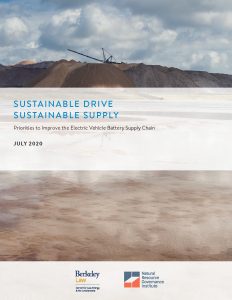 CLEE and the Natural Resource Governance Institute (NRGI) are pleased to release today the new report “Sustainable Drive, Sustainable Supply: Priorities to Improve the Electric Vehicle Battery Supply Chain.” The report identifies key challenges and solutions to ensure battery supply chain sustainability through a multi-stakeholder approach, based on our outreach to experts in the field.
CLEE and the Natural Resource Governance Institute (NRGI) are pleased to release today the new report “Sustainable Drive, Sustainable Supply: Priorities to Improve the Electric Vehicle Battery Supply Chain.” The report identifies key challenges and solutions to ensure battery supply chain sustainability through a multi-stakeholder approach, based on our outreach to experts in the field.
The global transition from fossil fuel-powered vehicles to battery electric vehicles (EVs) will require the production of hundreds of millions of batteries. This massive deployment frequently raises questions from the general public and critics alike about the sustainability of the battery supply chain, from mining impacts to vehicle carbon emissions.
To address these questions, CLEE and NRGI are conducting a stakeholder-led research initiative focused on identifying strategies to improve sustainability and governance across the EV battery supply chain. We convened leaders from across the mining, battery manufacturing, automaker, and governance observer/advocate sectors, to develop policy and industry responses to human rights, governance, environmental, and other risks facing the supply chain.
“Sustainable Drive, Sustainable Supply” identifies the following key challenges to ensuring battery supply chain sustainability:
- Lack of coordinated action, accountability, and access to information across the supply chain hinder sustainability efforts
- Inadequate coordination and data sharing across multiple supply chain standards limit adherence
- Regulatory and logistical barriers inhibit battery life extension, reuse, and recycling
The report recommends the following priority responses that industry, government and nonprofit leaders could take to address these challenges:
- Industry leaders could strengthen mechanisms to improve data transparency and promote neutral and reliable information-sharing to level the playing field between actors across the supply chain and between governments and companies
- Industry leaders and third-party observers could ensure greater application of supply chain sustainability best practices by defining and categorizing existing standards and initiatives to develop essential criteria, facilitate comparison and equivalency, and streamline adherence for each segment of the supply chain
- Governments and industry leaders could create new incentives for supply chain actors to participate in and adhere to existing standards and initiatives, which may include sustainability labeling and certification initiatives
- Industry leaders could design batteries proactively for disassembly (enabling recycling and reuse), and industry leaders and governments could collaborate to build regional infrastructure for battery recycling and transportation and create regulatory certainty for recycling
We hope the responses to the supply chain challenges outlined in this report will provide guidance on the initial actions stakeholders can take to make this broader vision of implementation a reality, ensuring a more robust future for communities around the globe as well as for all-important electric vehicle adoption to meet climate change goals.
To learn more about this issue and the new report, join our 9am PT / Noon ET webinar today, featuring:
- Patrick Heller, Senior Visiting Fellow, Center for Law, Energy & the Environment (CLEE) & Advisor, Natural Resource Governance Institute (NRGI)
- Michael Maten, Automotive Public Policy, Electrification, Portfolio Planning and Strategy, General Motors
- Daniel Mulé, Senior Policy Advisor for Tax and Extractive Industries, Oxfam
- Payal Sampat, Mining Program Director, Earthworks
You can register for the webinar; read our recent FAQ on EV batteries for more information on current supply chain impacts on human rights, climate change and the local environments; and download the new report “Sustainable Drive, Sustainable Supply: Priorities to Improve the Electric Vehicle Battery Supply Chain.”
The post How To Ensure A More Sustainable Supply Chain For Electric Vehicle Batteries appeared first on Legal Planet.
By: Ethan Elkind
Title: How To Ensure A More Sustainable Supply Chain For Electric Vehicle Batteries
Sourced From: legal-planet.org/2020/07/23/how-to-ensure-a-more-sustainable-supply-chain-for-electric-vehicle-batteries/
Published Date: Thu, 23 Jul 2020 11:30:03 +0000
Vist Maida on Social Me
Website Links
Maida Law Firm - Auto Accident Attorneys of Houston, by fuseology

No comments:
Post a Comment